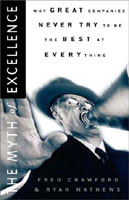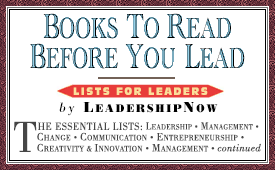
|
 |
The Myth of Excellence: Why Great Companies Never Try to Be the Best at Everything Fred Crawford and Ryan Mathews 
Format: Paperback, 272pp. ISBN: 9780609810019 Publisher: Currency Pub. Date: May 27, 2003 Average Customer Review: For Bulk Orders Call: 626-441-2024 Description and Reviews From The Publisher: The Undiscovered Consumer . . .and the Mistake of Universal Excellence What do customers really want? And how can companies best serve them? Fred Crawford and Ryan Mathews set off on what they describe as an "expedition into the commercial wilderness" to find the answers. What they discovered was a new consumer -- one whom very few companies understand, much less manufacture products for or sell products or services to. These consumers are desperately searching for values, a scarce resource in our rapidly changing and challenging world. And increasingly they are turning to business to reaffirm these values. As one consumer put it: "I can find value everywhere but can't find values anywhere." Crawford and Mathews's initial inquiries eventually grew into a major research study involving more than 10,000 consumers, interviews with executives from scores of leading companies around the world, and dozens of international client engagements. Their conclusion: Most companies priding themselves on how well they "know" their customers aren't really listening to them at all. Consumers are fed up with all the fuss about "world-class performance" and "excellence." What they are aggressively demanding is recognition, respect, trust, fairness, and honesty. Believing that they are still in a position to dictate the terms of commercial engagement, businesses have bought into the myth of excellence -- the clearly false and destructive theory that a company ought to be great at everything it does, that is, all the components of every commercial transaction: price, product, access, experience, and service. This is always a mistake because "the predictable outcome [is] that the company ends up world-class at nothing; not well-differentiated and therefore not thought of by consumers at the moment of need." Instead, Crawford and Mathews suggest that companies engage in Consumer Relevancy, a strategy of dominating in one element of a transaction, differentiating on a second, and being at industry par (i.e., average) on the remaining three. It's not necessary for businesses to equally invest time and money on all five attributes, and their customers don't want them to. Imagine the confusion if Tiffany & Co. started offering deep discounts on diamonds and McDonald's began selling free-range chicken and tofu. The Myth of Excellence provides a blueprint for companies seeking to offer values-based products and services and shows how to realize the commercial opportunities that exist just beyond their current grasp -- opportunities to reduce operating costs, boost bottom-line profitability, and, most important, begin to engage in a meaningful dialogue with customers. Reviews Tired of business drivel? If you are ready to step beyond platitudinous mission statements and strategies cooked up in distant boardrooms that have no connection to the trenches where business battles are actually being fought, this is the book for you. It is grounded, readable, and honest -- just like your business should be. —Paco Underhill, author of Why We Buy: The Science of Shopping The Myth of Excellence stands apart from the deluge of business books on the market with its candor and readability. For the brand-marketing executive, the book provides some especially revealing insights into underlying consumer values. Even more refreshing is the authors' approach to imparting business lessons through real research and first-hand case studies. —C. Manly Molpus, president and chief executive officer, The Grocery Manufacturers of America "Everyone in business thinks they really know their customers and what they want. But, in The Myth of Excellence, Fred Crawford and Ryan Mathews have given me new and useful insights into the startling changes taking place before our very eyes. When they tell us, for example, that 'human values are the contemporary currency of commerce,' they are not just offering another new business platitude but rather a new lens through which to view the consumer -- a lens very few people understand. The Myth of Excellence is both a big idea and a blueprint for action. A true must-read. —Michael Burandt, president, North American Consumer Products, Georgia-Pacific Corporation Today's customers are leading a revolution against business as usual: They are demanding that companies recognize them as individuals and conduct business on their terms. In The Myth of Excellence, Crawford and Mathews provide proven strategies for meeting the demands of today's empowered customers, who are crying out to be treated with respect, dignity, and courtesy. —Thomas M. Siebel, chairman and chief executive officer, Siebel Systems, Inc.
About the Authors Fred Crawford is executive vice president and global sector leader of Cap Gemini Ernst & Young's consumer products, retail, and distribution consulting practice. From his base in New York City he travels the globe working with senior executives on how to reach today's elusive consumer. Ryan Mathews is a principal at FirstMatter LLC, a leading futurist firm that works with companies such as Procter & Gamble, Unilever, Grey Advertising, General Motors, Georgia-Pacific, and Coca-Cola to anticipate the trends shaping corporate America, global business, and e-commerce. Table of Contents
Find Items On Similar Subjects |
|

The Essential Lists BOOKS TO READ BEFORE YOU LEAD 
Grow Your Leadership Skills NEW AND UPCOMING LEADERSHIP BOOKS 
Classic Leadership Books BOOKS TO READ BEFORE YOU LEAD |
 |
| ||
 | © 2020 LeadershipNow™ All materials contained in https://www.LeadershipNow.com are protected by copyright and trademark laws and may not be used for any purpose whatsoever other than private, non-commercial viewing purposes. Derivative works and other unauthorized copying or use of stills, video footage, text or graphics is expressly prohibited. |
||